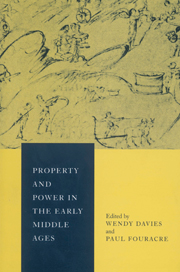Book contents
- Frontmatter
- Contents
- List of maps
- Preface
- List of abbreviations
- Introduction
- 1 The ideology of sharing: apostolic community and ecclesiastical property in the early middle ages
- 2 Teutsind, Witlaic and the history of Merovingian precaria
- 3 Eternal light and earthly needs: practical aspects of the development of Frankish immunities
- 4 The wary widow
- 5 Lordship and justice in the early English kingdom: Oswaldslow revisited
- 6 Adding insult to injury: power, property and immunities in early medieval Wales
- 7 Property transactions and social relations between rulers, bishops and nobles in early eleventh-century Saxony: the evidence of the Vita Meinwerci
- 8 Monastic exemptions in tenth- and eleventh-century Byzantium
- 9 Property ownership and signorial power in twelfth-century Tuscany
- 10 Conclusion: property and power in early medieval Europe
- Glossary
- List of works cited
- Index
1 - The ideology of sharing: apostolic community and ecclesiastical property in the early middle ages
Published online by Cambridge University Press: 25 January 2010
- Frontmatter
- Contents
- List of maps
- Preface
- List of abbreviations
- Introduction
- 1 The ideology of sharing: apostolic community and ecclesiastical property in the early middle ages
- 2 Teutsind, Witlaic and the history of Merovingian precaria
- 3 Eternal light and earthly needs: practical aspects of the development of Frankish immunities
- 4 The wary widow
- 5 Lordship and justice in the early English kingdom: Oswaldslow revisited
- 6 Adding insult to injury: power, property and immunities in early medieval Wales
- 7 Property transactions and social relations between rulers, bishops and nobles in early eleventh-century Saxony: the evidence of the Vita Meinwerci
- 8 Monastic exemptions in tenth- and eleventh-century Byzantium
- 9 Property ownership and signorial power in twelfth-century Tuscany
- 10 Conclusion: property and power in early medieval Europe
- Glossary
- List of works cited
- Index
Summary
The Acts of the Apostles record how the church at Jerusalem grew to ‘a multitude of them that believed who were of one heart and of one soul; neither said any of them that aught of the things which he possessed was his own, but they had all things in common. Neither was there any among them that lacked: for as many as were possessors of lands or houses sold them and brought the prices of the things that were sold and laid them down at the Apostles’ feet; and distribution was made unto every man according as he had need' (Acts 4: 32, 34). While ancient philosophers had discussed societies without private property, and Luke's vocabulary in this passage has been linked to Aristotle, the Christian church claimed that at its origin it had actually instituted a new attitude to property: private ownership was replaced by a singlenesss of heart which required property to be shared. Luke goes on to tell how Barnabas sold his fields and laid the proceeds at the feet of the Apostles, while Ananias and Saphira kept their property in order to swindle the church and were put to death.
Despite the conversion of post-Roman rulers to Christianity, they and their subjects did not share their wealth with their chosen church following this apostolic model. The first urban Christians never maintained their ideal of common property. To explain their changed priorities they developed a theory of property and of history, primarily through reading those patristic authors who had explored the role of wealth in Christian society and by adapting their teachings in their own ecclesiastical legislation and patristic exegesis.
- Type
- Chapter
- Information
- Property and Power in the Early Middle Ages , pp. 17 - 30Publisher: Cambridge University PressPrint publication year: 1995
- 18
- Cited by



